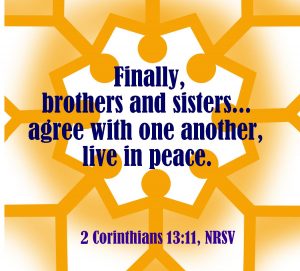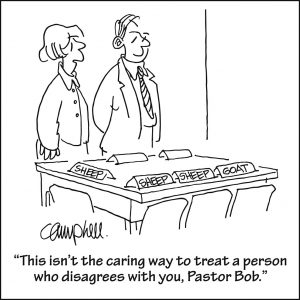Choices change our lives…
By Barbara Dahlgren

Many live under the assumption that everyone they meet should like them. I have no such unrealistic expectations. How could everyone like me? After all, I don’t like everyone I meet. This includes Christians and non-Christians. Of course, as Christians, I think we should make an effort to get along with everyone, including (or should I say especially) each other, even if we don’t see eye to eye on everything. However, there is no need to put ourselves in situations where we come in constant contact with someone we don’t work well with if we have other options.
Such was the case with Paul and Barnabas. Both Paul and Barnabas were dedicated servants of God. After Paul’s conversion, he had a difficult time convincing Christians of his sincerity. And rightly so! Was this not the man who had been a vicious persecutor of Christians? It was Barnabas who persuaded the disciples to give him a chance, and a friendship formed between the two of them. (Acts 9:26-28) They even went on a missionary journey together.
Joining them on this journey was Barnabas’ cousin John Mark. (Colossians 4:10) For some reason, John Mark decided to return home to Jerusalem while Paul and Barnabas completed the mission. (Acts 13:13) John Mark’s decision did not set well with Paul. When another missionary trip was planned and Barnabas suggested taking John Mark again, Paul balked at the thought. So much so that a “sharp contention” developed between the two of them. (Acts 15:36-41) They couldn’t reach an agreement, so they agreed to disagree and split up. Paul took Silas on his journey, while Barnabas went with John Mark.
Now here were two servants of God who couldn’t agree on an issue. This wasn’t a deep theological or doctrinal concern, yet it was a difference of opinion on how to proceed with the work of God. They decided to go their separate ways. We hear nothing about them bad mouthing each other or putting one another down. They merely agreed to disagree.
The Bible says nothing about who was right or who was wrong in this instance. Some commentaries say Paul was too stubborn. Perhaps, but others feel Paul was guided by logic while warm hearted Barnabas was influenced by John Mark being family. Both Paul and Barnabas were praying to the same God for guidance and both reached a different conclusion. The point is that in some situations there isn’t a right or wrong – just a different point of view.
Although we hear nothing about Paul and Barnabas working together again, years later Paul mentions Barnabas fondly in 1 Corinthians 9:6 as a coworker for Christ. It seems Paul and Barnabas maintained a mutual respect for one another, which is difficult to do when you agree to disagree with someone. Paul even had a change of heart about John Mark. In 2 Timothy 4:11 he says, “Get Mark and bring him with you, for he is useful to me for ministering.”
Consider this…Circumstances change and so do people. How many of us find ourselves eventually valuing someone we once had little regard for?
Because we all have different strengths and weaknesses, not everyone we meet is going to like us, nor are we going to like everyone we meet. And no matter how hard we try, we will not get along with everyone. The sooner we realize that, the better off we’ll be. But developing the art of agreeing to disagree can avoid conflict, prevent hasty conclusions, and allow time to reevaluate situations. We don’t have to see eye to eye on every issue to live heart to heart.
One final thought… Believe it or not, there are ways to disagree without being disagreeable.


